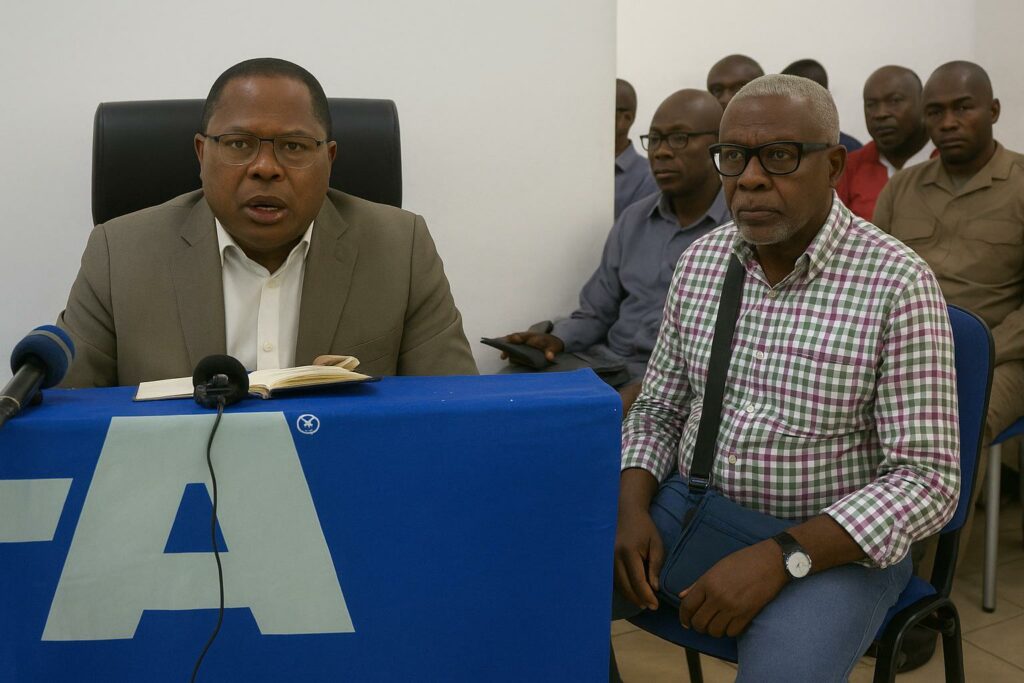Ignié option gains momentum among stakeholders
The Congolese football season of 2025-2026, once threatened with outright cancellation, may yet find refuge some forty kilometres north-west of Brazzaville. At a consultative meeting on 29 October, Federation president Jean Guy Blaise Mayolas revealed that the National Technical Centre in Ignié has emerged as “the only realistic lifeline” capable of hosting both Ligue 1 and Ligue 2 matches. Club presidents, secretaries-general and federation officials agreed in principle to concentrate the entire calendar on the twin pitches of the complex, pending final technical audits.
The sense of urgency was palpable. Two consecutive blank seasons would expose Congolese football to an exodus of its most promising players and a forfeiture of continental berths. “Our duty is to guarantee competition, however atypical the format,” insisted Mayolas, whose remarks were later confirmed by Fécofoot’s communications unit (Fécofoot press briefing, 29 Oct.).
Stadium closures, governance concerns and ministerial silence
The unprecedented move toward a single-site championship is rooted in the prolonged closure of major municipal stadiums. Officially, the Ministry of Sports has linked the lockdown to investigations into alleged match manipulation and referee corruption. Yet Fécofoot notes that several individuals named in the now-infamous audio recording have already been sanctioned by the federation’s disciplinary bodies, a point reiterated by Mayolas as he questioned “the rationale for an open-ended collective punishment”.
Correspondence exchanged since August between Fécofoot and the minister’s office, seen by our newsroom, shows little progress beyond procedural acknowledgments. Club executives, while signalling respect for governmental prerogatives, privately concede that administrative inertia is bleeding their operational budgets. They have nonetheless mandated the federation to seek a direct audience with Minister Charles Makaya in the hope of brokering a phased reopening of at least two provincial venues.
FIFA-supervised upgrades to meet elite criteria
Relocating the national leagues to Ignié is no mere logistical shift; it requires accelerated compliance with international safety and broadcast standards. A joint Fécofoot–FIFA engineering team has already inspected drainage, lighting and seating configurations. Work crews are reinforcing the perimeter fences, installing modular dugouts and refurbishing the locker rooms so that each can host back-to-back fixtures without compromising player welfare.
Financially, the rehabilitation remains modest compared with a full stadium retrofit. Federation accountants estimate a budget envelope under two million dollars, primarily absorbed by turf reinforcement and CCTV installation. Sources close to the project report that the world governing body would underwrite up to forty percent through its Forward programme, conditional on audited procurement.
Economic and competitive stakes for clubs
For the twenty-six clubs spread across the two tiers, centralisation poses both challenges and opportunities. Travel costs will fall dramatically, yet match-day revenue—already meagre—could shrink further if attendance protocols limit crowd size for security reasons. Club presidents are therefore lobbying for a pooled commercial rights package, allowing collective negotiation of television and signage deals to cushion the shortfall.
On the sporting front, Ignié’s proximity to Brazzaville ensures that scouts from regional powerhouses can still monitor emerging talent, preserving the showcase value of the league. Moreover, CAF licensing rules stipulate that national representatives must complete at least one domestic competition within a two-year cycle. Failure to do so would bar Congolese clubs from the Champions League and Confederation Cup, a prospect that adds weight to the Ignié contingency plan.
Legal and governance perspective
Under Congolese administrative law, the State retains ownership of public stadiums, but sports federations enjoy a recognised mandate to organise competitions. Legal experts consulted by our editorial board underline that the current impasse tests the balance between public oversight and associative autonomy. While the ministry can invoke safety grounds to restrict access, prolonged closure without a clear remediation timetable could be challenged as a disproportionate measure hindering freedom of association.
Yet all parties appear keen to avoid litigation. Mayolas speaks of “constructive dialogue within the national interest”, echoing an institutional culture that privileges consensus over confrontation. The coming weeks will reveal whether the Ignié project becomes a stop-gap solution or a catalyst for a broader reform of football governance in the Republic of the Congo.

